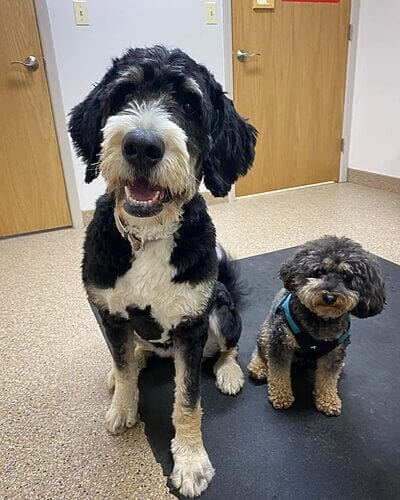Is Your Bernedoodle Suffering from Itchy Skin? Here’s How to Help

Is your once playful Bernedoodle constantly scratching and chewing at their skin? Witnessing your beloved furry friend struggle with Bernedoodle skin problems can be heartbreaking. But fear not, you’re not alone! Many Bernedoodles experience various skin issues throughout their lives. This article dives deep into understanding the most common Bernedoodle skin problems, their causes, and most importantly, how to help your itchy companion find relief.
Understanding Bernedoodle Itchy Skin and Allergies
If you’re searching online for “Bernedoodle itchy skin” or “Best food for Bernedoodles with allergies,” you’ve likely noticed the frustration other owners share. Bernedoodles, despite being often considered hypoallergenic, can develop allergies to food and environmental triggers. These allergies manifest as itchy skin, rashes, and even recurrent ear infections. While some Bernedoodle skin problems are easily managed, others require a more comprehensive approach from a veterinarian.
“A dog is the only thing on earth that loves you more than he loves himself.” – Josh Billings
Treat Bernedoodle Skin Problems with Knowledge and Care
This guide empowers you with the knowledge to navigate the world of Bernedoodle skin problems. We’ll explore the most common causes, identify signs and symptoms, and discuss various treatment options. Additionally, we’ll provide tips for preventing future flare-ups and maintaining your Bernedoodle’s overall skin health.
Understanding Common Bernedoodle Skin Problems
Several factors can contribute to Bernedoodle skin problems. Here’s a breakdown of the most frequent culprits:

- Allergies (food and environmental): As mentioned earlier, allergies are a significant player in Bernedoodle skin problems. Food allergies can be triggered by ingredients like chicken, beef, or dairy. Environmental allergies, on the other hand, stem from exposure to pollen, dust mites, or mold.
- Atopic Dermatitis: This chronic, inflammatory skin condition causes intense itching and irritation. While the exact cause is unknown, genetics and environmental factors are believed to be involved.
- Seborrhea: This condition disrupts the normal oil production cycle in your Bernedoodle’s skin, leading to dryness, flakiness, or oily, greasy fur.
- Yeast Infections: A buildup of yeast (Malassezia) on your Bernedoodle’s skin can cause itching, redness, and a distinctive odor.
- Bacterial Skin Infections: Scratches and wounds can open the door to bacterial infections, causing further irritation and discomfort.
Identifying the Cause of Your Bernedoodle’s Skin Problems
While the signs of Bernedoodle skin problems can be similar across various conditions, pinpointing the exact cause is crucial for effective treatment. Here’s what to watch for:
- Signs and Symptoms: Excessive scratching, chewing, or licking at the skin are classic signs of discomfort. Look for redness, inflammation, scabbing, or hair loss in affected areas.
- Importance of Veterinary Diagnosis: A visit to your veterinarian is essential for a proper diagnosis. They can perform tests like skin scrapes, cytology, or blood tests to identify the underlying cause of your Bernedoodle’s skin problems. Bernedoodle vet care is crucial for a healthy and happy life.
Treatment Options for Bernedoodle Skin Problems
Fortunately, there are various treatment options available for Bernedoodle skin problems. The specific approach will depend on the diagnosed cause. Here are some common strategies:

- Dietary Changes (hypoallergenic food): If food allergies are the culprit, switching to a hypoallergenic diet formulated with limited ingredients can significantly improve your Bernedoodle’s skin health.
- Medication (prescription and over-the-counter): Antibiotics can help combat bacterial infections, while antihistamines offer relief from allergic reactions. Your veterinarian can prescribe the most appropriate medication for your Bernedoodle’s specific needs.
- Topical Treatments (shampoos, ointments): Medicated shampoos and ointments can soothe irritated skin, reduce inflammation, and promote healing.
- Supplements and Fatty Acids: Omega-3 and Omega-6 fatty acids can contribute to a healthy skin barrier and overall coat health. Consult your veterinarian before introducing any supplements to your Bernedoodle’s diet.
Preventing Bernedoodle Skin Problems
While some Bernedoodle skin problems are unavoidable, there are proactive steps you can take to minimize their occurrence:
- Proper Grooming and Bathing: Regular brushing helps remove allergens and dead skin cells, while occasional baths with a gentle, hypoallergenic shampoo can keep your Bernedoodle clean and comfortable. Bernedoodle grooming is an important part of maintaining good skin health.
- Environmental Management: If your Bernedoodle suffers from environmental allergies, try to identify and minimize exposure to triggers like dust mites (frequent vacuuming and washing bedding) or pollen (limiting outdoor time during high pollen counts).
- Maintaining a Healthy Diet: A well-balanced diet rich in essential nutrients promotes healthy skin and a strong immune system, better equipping your Bernedoodle to fight off allergies and infections.
Living with a Bernedoodle with Skin Problems
Even with the best preventative measures, flare-ups can sometimes occur. Here are some tips for managing your Bernedoodle’s skin problems and keeping them comfortable:

- Tips for Managing Itching and Discomfort: An Elizabethan collar (cone) can prevent further self-inflicted irritation by scratching or chewing. Provide plenty of distractions and playtime to take their mind off the itch.
- Emotional Support for Your Dog: Skin problems can be frustrating for your Bernedoodle. Offer extra love, cuddles, and positive reinforcement to help them cope with the discomfort.
- The Importance of Patience and Consistency: Finding the right treatment plan might take some time and experimentation. Be patient, consistent with your veterinarian’s recommendations, and celebrate even small improvements.
Additional Points:
- Inherited Skin Conditions: Some Bernedoodle skin problems can be hereditary. Responsible breeders screen their breeding stock for these conditions to minimize their occurrence in future generations.
- Veterinary Healthcare Centers: The Association for Pet Dog Breeders (APDB) provides a directory of reputable breeders who prioritize the health and well-being of their Bernedoodles. Consider contacting an ADBP member breeder for more information on Bernedoodle health.
When to See a Vet for Your Bernedoodle's Skin Problems
If your Bernedoodle’s skin problems persist despite home care, worsen significantly, or are accompanied by additional symptoms like lethargy, vomiting, or diarrhea, schedule an appointment with your veterinarian right away. Early diagnosis and treatment are crucial for optimal healing and preventing complications.
Here are some additional tips for finding a Bernedoodle-savvy veterinarian:
- Talk to your local Bernedoodle breeders or rescue organizations. They may have recommendations for veterinarians experienced in treating Bernedoodles.
- Look for a veterinarian who is a member of the American College of Veterinary Dermatology (ACVD). These veterinarians have completed specialized training in diagnosing and treating skin conditions in animals. You can find a directory of ACVD members on their website: https://www.acvd.org/.
- Read online reviews of veterinary practices in your area. Pay attention to what other Bernedoodle owners have to say about their experiences.

By following these tips, you can find a qualified veterinarian who can provide the best possible care for your Bernedoodle’s skin problems.
Ending FAQ:
Can I use home remedies to treat my Bernedoodle’s skin problems?
While some home remedies like oatmeal baths or coconut oil application might offer temporary relief, consulting your veterinarian is always recommended. They can diagnose the underlying cause and recommend the most effective treatment plan for your Bernedoodle’s specific needs.
What kind of food should I feed my Bernedoodle with allergies?
If your veterinarian determines food allergies are causing your Bernedoodle’s skin problems, they might recommend a hypoallergenic diet formulated with limited ingredients, novel proteins, or hydrolyzed proteins.
How often should I bathe my Bernedoodle to prevent skin problems?
The frequency of baths depends on your Bernedoodle’s individual needs and coat type. Generally, once every 4-8 weeks with a gentle, hypoallergenic shampoo is sufficient. However, consult your veterinarian for specific bathing recommendations for your Bernedoodle.
When should I take my Bernedoodle to the vet for skin problems?
Schedule a vet visit if your Bernedoodle’s skin problems persist for more than a week, worsen significantly, or are accompanied by other concerning symptoms. Early diagnosis and treatment are crucial for a speedy recovery and preventing complications.
Remember: A healthy and happy Bernedoodle starts with a healthy coat! By understanding Bernedoodle skin problems, their causes, and available treatment options, you can effectively manage your furry friend’s discomfort and ensure they live a long, itch-free life.
Petscaretip – How To Care Your Pets
Address: 809 Dallas St, Houston, TX 77002, USA, Houston, TX, United States, Texas
Email: [email protected]









